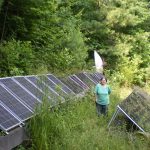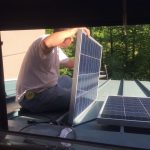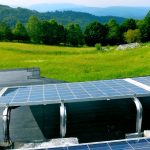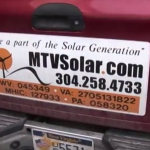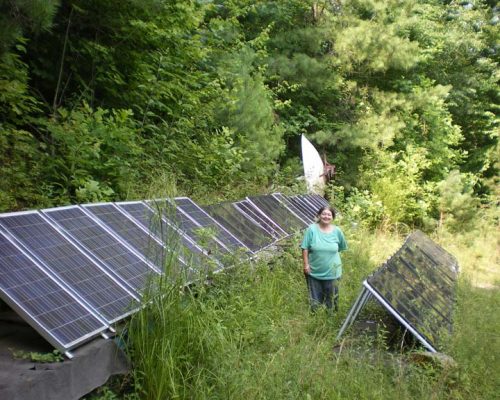
They played the game and became friends. Three months later, Elijah was stunned to find out his friend was a woman. She lived north of Ottawa, in northern Canada, and soon she was walking a mile to the nearest phone booth, depositing ten dollars of quarters in the machine so she could talk to them. “I couldn’t believe it,” he said, talking about the similarities between his childhood in rural Kentucky and hers in the French Canadian province. “We lived the exact same life.” Finally, she and her daughter flew to Richmond, Virginia to meet him and his son, and today they are married. “What are the chances?” he asks. “That’s got to be one in a million easy. I’ve got to believe the creator had His hand in that.”
While their meeting may have been arranged by providence, their life has at times been less than blessed. Years of working on his own as an electrician finally took its toll on Elijah Collett’s body. “My back been broke twice from lifting heavy weights.” Moreover, he had an undiagnosed case of osteoporosis. “I worked at a lot of things, burning the candle at both ends, walking like a zombie. I knew the harder times was coming.” When they came, they not only took the strength in his back, but the better part of his eyesight as well. “I like to read, and now I have to get a magnifying glass to read. Sometimes, I go off and cry. If I fall a certain way, I’ll be paralyzed from the neck down.” His pale blue eyes tear up as he talks about his physical limitations and the woman who saved him from them. He nods to his wife. “The doctor said without her, I’d be a dead man right now.” He shakes his head in wonder. “A woman can do everything a man can do.”
Because he could no longer work, the Colletts were forced to live on Elijah’s disability check of six hundred dollars a month. They pride themselves on living simply, but soon they couldn’t pay the electric bill. “It would be 500, 600 a month,” Guylaine says, puffing on a Pall Mall. “Almost everything we take in.” That’s when they decided to install solar panels for their mobile home.
“It was a necessity, it was a necessity, it was a necessity,” Elijah says. In order to raise money to buy the solar panels, Guylaine sold ginseng and fresh strawberries, and collected pop cans on the side of the road.
“We’d go for a ride and I’d bring four or five garbage bags,” Guylaine says. “The car was smelling horrible because some of the cans were used as tobacco spit cups.” But they could collect 80 cents a pound for the cans, $10 a gallon on strawberries, and they sold the ginseng at a flea market in Hazard. Soon they had enough money to buy the solar panels and free themselves from the onerous electric bill. “It has already paid for itself,â” Elijah said. “And we absolutely couldn’t get by without them.”
Elijah Collett’s family didn’t have electricity until the mid-60’s when he was five. “I asked my dad where it came from, and he couldn’t answer. He called it juice.” The family had gotten along fine without electricity or virtually any technology. When Elijah was born, his father rode his mother to the hospital on a horse for the delivery but they grew to love the radio. Elijah, however, was intrigued and soon began a lifelong fascination with electricity. He’d experiment on his own. “I soon learned what to touch and what not to touch because it will light you up.” His interest in electricity was fostered by his skill in math. “Electronics and electricity is all mathematics.Ev ery bit of it is.” By the time he entered high school, he already was proficient in algebra.
Now he’s used his expertise in electricity to save money and to help the environment, and he wants everyone to know that it works. Still, he’s quick to say, “I am not against coal. I want to get that on record.” He opposes mountaintop removal because of âwhat it does to the water but he has no issue with coal. “Let’s not give up on coal, we should do [coal] too but solar also works, and it’s a way to save money.” He laments the fact that most solar panels are made in China when they could just as easily be made in Kentucky. “That would bring new jobs and cut back on our bills. Think of all the buildings in Hyden with solar panels on them. Once they’re on, you’ve got them for twenty-five years. Long as the sun keeps shining, you’ve got energy.
Recently the Colletts have built an “Electricity Room” onto their trailer to house their fifty-two batteries. On the walls, Guylaine has scrawled messages in magic-marker to “Eljah,” her nickname for her husband. “Je T-Aime, Eljah. Tu est toute ma vie.[I love you, Eljah. You are my life.]
People are surprised you can do solar in the mountains, Elijah says. “Anybody can come here and see that it works. It’s limitless. All you need is five or six hours of sun.”
While the Colletts may have put the solar panels up from economic necessity, they also were inspired by their Biblical values to preserve the land. When asked how his spiritual principles inform his environmental actions, he calls for his well-thumbed and dog-eared Bible and the magnifying glass. Then he reads from the Book of Revelation:
And the nations were angry, and thy wrath is come, and the time of the dead, that they should be judged, and that thou shouldest give reward unto thy servants the prophets, and to the saints, and them that fear thy name, small and great; and shouldest destroy them which destroy the earth.
“He’s going to destroy those who destroy the earth,” Guylaine says. “When Christ returns you have to stand in front of him and explain why you destroyed His earth.”
“I take that very seriously,” Elijah says. “I live by the scripture, I treat people well, and reject violence. Money is not going to buy you everything. Things aren’t going to buy you happiness. The measure of a man is who he is.”
——-
Read this article on the Daily Yonder.
Reprinting this article or content with attribution is encouraged. Contact Mimi Pickering, mpickering at appalshop.org, 606 633-0108, for more information on publishing and high resolution photos. A Word Document of the story is attached.
This work is licensed under a Creative Commons Attribution 3.0 Unported License.


